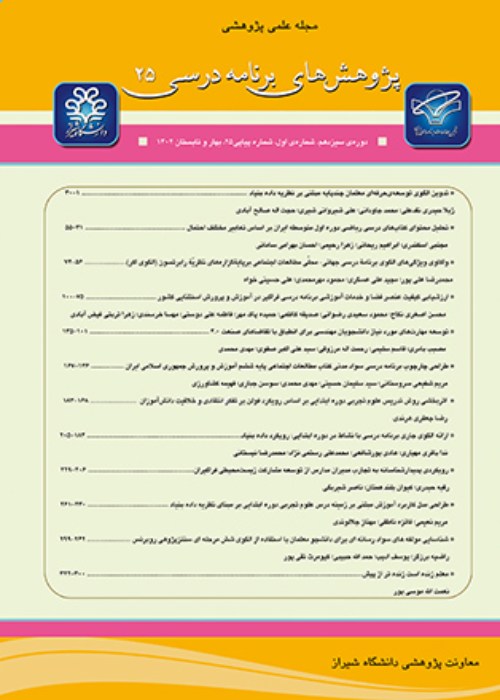Analyzing Teachers' Lived Experiences of the Conditions Governing Educational Leaders' Policies
Educational supervision and guidance include various patterns and dimensions and are viewed as efficient and effective tools which can help teachers play an effective role in achieve their desired educational results. Following the discourse of the necessity of educational supervision and guidance, Iranian education system has paid attention to the policies made by Iranian educational leaders during the recent years, for instance, through focusing on educational, administrative and financial resources of rural, nomadic and border schools with multi-grade classes and through training educational leaders who can guide and supervise the process of teaching and learning in deprived schools. The similarities between educational leaders' plans and general education policies increase the possibility for the implementation and evaluation of the plans. However, a review of the relevant studies can indicate that little feedback has been received from teachers, who are deeply involved in the implementation of educational leaders' policies. Indeed, a review of the previous literature can reveal that no research has been conducted to investigate teachers' viewpoints about the educational leaders' policies. Some previous studies have only sought educational leader' opinions about their impacts on educational processes and teacher performance. Most of these studies, however, neglect teachers and their roles in the teaching process. The present study, therefore, is an attempt to cover this issue through examining the strengths and weaknesses of educational leaders' policies from the perspective of teachers, who can help educational leaders improve their policies. A qualitative approach to research and a phenomenological method were used in order to cconduct this study. The study participants were selected from among rural, nomadic and multi-grade primary school teachers in the East Azerbaijan Province, Iran, and by using purposive sampling. Accordingly, 13 teachers, eight males and five females, with at least two years of working experience in rural areas and multi-grade classes, who were interested in taking part in the present study, were included in the study. The participanmts were then semistructurally interviewed and the data was recorded. The present researchers continued interviewing the participants until data saturation was achieved. Based on the analysis results, 4 main themes and 19 sub-themes were identified in this study. The main themes were concerned with psychological issues related to educational leaders, educational leaders' weaknesses, educational leaders' strengths, and educational leaders' professional and moral requirements. The first main theme, i.e. psychological issues related to educational leaders' policies, included the following subthemes: fear of encountering the leader and lack of sufficient motivation to face the leader. The second main theme, i.e. educational leaders' weaknesses, included the sub-themes of lack of knowledge and educational skills and leaders' unfamiliarity with rural and nomadic areas. The third main theme, i.e. educational leaders' strengths, consisted of the sub-themes of helping inexperienced teachers improve their professional competencies and increase their self-confidence. Finally, the fourth main theme, i.e. educational leaders' professional and moral requirements included lack of alignment between leaders' functional roles and other school authorities' roles. In general, it can be stated that the educational policy and the Educational Guidance Program were in line with the Article 9 of the general educational policies on transforming the country's education system for extending education and empowering teachers and students in border areas. Considering this, it can be observed that education authorities have taken some measures for implementation of this article. Of course, there is a need to follow and pay attention to educational leadership and policy through empowering and students who are living in deprived areas, villages, suburbs, and nomadic tribes and creating diverse educational opportunities. Despite these, there are still weaknesses in educational leaders' policies. This can signify poor implementation of educational policies. Therefore, strong educational leaders need to be elected for the effective implementation of the desired educational policies. Furthermore, data concerning the efficacy of the implemented educational policicies must be continuously collected from teachers and used to solve the probable problems arising from poor implementation of them. This issue is addressed by the Document of Fundamental Transformation of Education with an emphasis on the development of the field of research and increasing teahers' professional competencies through providing them with opportunities for sharing their experiences with their coleagues and allocating special funds for stimulating teachers' research activities.
- حق عضویت دریافتی صرف حمایت از نشریات عضو و نگهداری، تکمیل و توسعه مگیران میشود.
- پرداخت حق اشتراک و دانلود مقالات اجازه بازنشر آن در سایر رسانههای چاپی و دیجیتال را به کاربر نمیدهد.




